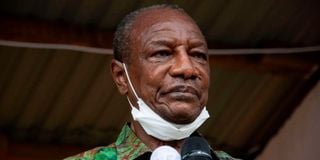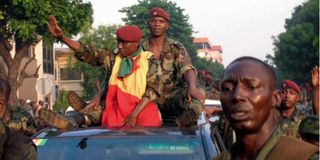Premium
Alpha Conde's fall was expected, just not this sudden

Ousted Guinean President Alpha Conde.
After a long wait following intense gunfire in parts of Guinea’s capital Conakry on Sunday, Guineans saw what many had been waiting for.
A group of armed soldiers, some draped in the country’s red, yellow and green flag, appeared on national television.
“I am forming the National Rally and Development Committee (CNRD), which will steer the country through a transition,” came the soft voice of the new man at the helm, Col Mamady Doumbuya, surrounded by his colleagues.
“My motive for the takeover is because of rampant corruption, mismanagement and the hardship seen in the country,” the 33-year-old member of the presidential guard added.
He then announced the dissolution of the government and parliament and the suspension of the constitution, as well as closure of the country's land borders and air space.
Wild celebrations
That confirmation of the end of the reign of President Alpha Conde was greeted with wild celebrations. Thousands of opposition supporters took to the streets, with some on vehicles jubilantly honking.
It is exactly what the opposition had been yearning for for a long time.
The campaign group, Front National Pour La Défense De La Constitution
(FNDC), summed up the feeling in a statement reacting to the military’s announcement.
“The FNDC observes this current situation in our country and takes note, inter alia, of the statement made by this military Committee announcing the dissolution of the “constitution” of the 3rd term and all institutions arising from the constitutional coup d'état imposed on the people of Guinea through repression and a mock election on 22 March 2020,” it said.
FNDC, a coalition of civil society and some opposition parties, was at the forefront of nationwide protests against Conde’s controversial third term bid. It considered the government as “illegitimate and unconstitutional”.
New path for Guinea
The group has called for a general consultation with all stakeholders to chart a new path for Guinea.
Guinea, a mineral-rich west African nation, has never had a peaceful democratic change of power. And Conde, who, ironically, was the first president to be elected in a democratic and free election, has made sure to keep that tradition that began from independence in 1958.
The former political science professor first came to power in 2010, marking the end of a transition from two military coups that ended the 24-year rule of Lansana Conteh, who himself assumed power by force, following the death of independence leader Sekou Touray.
The 83-year-old Conde made a name for himself as an opposition activist and a critic of the Conteh regime, which was saddled in allegations of corruption and nepotism.
Conde’s election in 2010, albeit in controversial circumstances, brought about hope for Guineans. But he soon deviated, displaying autocratic tendencies by detaining and silencing political opponents.
While Sunday’s development offers Guinea a fresh chance, it also spells an uncertain future.
Unfulfilled promises
Firstly, the country has been here before. The military came, it promised, and it failed. The coup following Conteh’s death in 2008 was staged by Captain Moussa Dadis Camara, who was later forced out by his colleagues after appearing to renege on his promises of transferring power to a civilian. That experience will be in the minds of many Guineans with the promises coming from this new Junta.

Coup leader Moussa Dadis Camara (draped in flag) waves to crowds as he is driven through the streets of Conakry, Guinea in this December 24, 2008 picture.
There is also the issue of ethnic division, which has been a historical phenomenon, but which critics say reached a crescendo under the watch of Conde. Whoever becomes president in the near future will have the uphill task of dealing with that.
Finally, there is the common enemy — corruption — which is the main reason the military gave for taking over on Sunday.
Minerals
Guinea boasts of one of the largest deposits of bauxite and iron ore.
It also has huge deposits of diamond, among a vast amount of other minerals like gold, salt, cement and granite.
Under Conde, the mining sector flourished. But observers say very little trickled down to the masses, who were constantly faced with a rising cost of living amid deficiency in basic services like power, water, sanitation and hygiene.
Col. Doumbouya touched on this in his address.
“The duty of a soldier is to save the country. The personalisation of political life is over. We will no longer entrust politics to one man, we will entrust it to the people,” noted the former head of the Special Forces, an elite unit within the Guinean army.
“If you see the state of our roads, if you see the state of our hospitals, you realise that after 72 years, it’s time to wake up,” he stressed.
Conde’s more than a decade long rule has been shrouded in allegations of corruption involving bribery by multinational corporations. One prominent case came to light in 2016 when recordings appeared online revealing that the British mining giant, Rio Tinto, paid Guinean officials and close acquaintances of the president USD10.5 million as bribe to facilitate their acquisition of mining rights in Simandou — an area estimated to have the world’s largest deposit of iron ore.
Bad ending
The signs of a bad ending for the regime were obvious, only that the president and his men could not see them. And the failure to recognise this led them to engage in actions that precipitated their downfall.
Recent weeks witnessed an increase in taxes, which the government defended as necessary to raise much needed revenue. The prices of fuel also went up by 20 per cent.
To hit the last nail on the coffin, the government sponsored a bill that cut down on the salaries of employees in the security sector, including the military and police, while increasing budgetary allocations for the presidency and parliament. Lawmakers approved that document just a week to Sunday’s coup.
This development in Guinea will surely send a shockwave in neighbouring Cote d’Ivoire, where Alassane Ouattara also defied popular views by changing the constitution to remain in power for a third term.
Mali, another neighbour, had a coup earlier this year and is under a military junta regime amid pressure to return the country to civilian rule.





